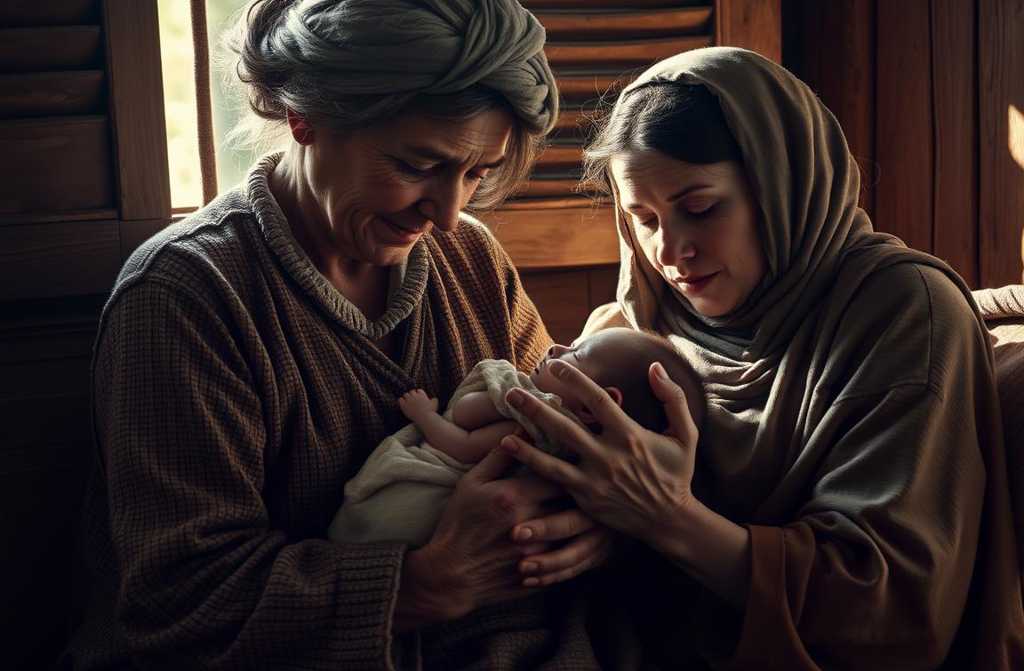A Stepmothers Motherly Heart
Not long ago, the wedding bells had rung. Not long ago, the family had gathered together, singing, dancing, and laughingno one could have guessed it would be their last reunion. Only the mother-in-law sat scowling in the corner. Shed taken an instant dislike to the delicate, slender little bride. “Pretty enough, Ill grant you,” she muttered to herself, “but what good is beauty when she looks like she couldnt lift a bundle of sticks, let alone a bucket of water? Ive worked myself raw all my life, and now my son brings home this wisp of a thingnot a replacement, just extra weight in the house.” Prudence (for that was her name) chewed over her grievances, and her displeasure did not escape Marys notice.
Michael soothed his young wife but warned her thered be no leniency from his mother. “Shes never had time for small, frail things. To her, strength is in the hands, the broad back, the quick stride. She once knocked my drunken father into bed with one shove. When she hitched the horses, even the stable lads stepped aside. Shed walk behind the plough with her spine straight, those broad hands gripping tight, turning the earth into gleaming furrows. At haymaking, shed stack a rick in an hour while a whole crew fumbled half a day and still only managed a sad little heap.”
God had given her a mans strength, it seemed, and taken a womans tenderness in trade. Marys own mother hadnt been keen on the match eitherMary wasnt too young, but no one wanted to tuck a daughter under Prudences thumb. They lived close enough for Marys mother, Margaret, to marvel at Prudences unnatural mighthow shed single-handedly replaced the roof thatch, ploughed the fields, built the haystacks. What sort of daughter-in-law could ever please her? And if anyone tried, theyd only tire themselves out and become Prudences next joke.
But Mary wouldnt listen. She knew her own mind and trusted that time would soften the old woman. “Shell sit with the grandchildren soon enough,” she thought, “and Michael and I will run things our way. Its two against onewell manage.” The idea of losing her sweetheart over Prudences temper was unthinkable.
No one knew the war was coming. No one guessed that instead of joy, separation and tears lay ahead. Six months after the wedding, the war began. To Mary, those months felt like a trial period. Michael doted on her, which only vexed Prudence further. “What sort of man wont even let his wife carry a bucket?” shed grumble. “Always hugging, always kissingsoft as his good-for-nothing father, that one.”
Prudences own marriage had been a transaction. Her mother, desperate to escape poverty, had pushed her into the arms of a widower whose wife had died of measles. The man was meek, drank quietly, and owned a cow and a horsewhat more could a woman want? Exhausted and alone with a child, hed taken one look at Prudences rough features, her towering frame, and declared, “Well, youll do as a housekeeper.”
For two weeks, neither spoke. Only the little boy clung to her skirts, smiling, begging to be held. In time, Prudence became the housekeeper she was meant to bebut she never loved her husband. Nor did he show her kindness. The only warmth in her life came from the boy, Michael, whose love she returned fiercely.
She raised him with a firm handlessons taught patiently, but also a strap when needed. Two warnings, then consequences. Afterward, shed weep, begging forgiveness, and theyd reconcile. Michael grew up handsome, kind, devoted to her. When his father died, neither mourned deeply. Prudence squared her shoulders and told him, “I never wanted to be a stepmother, son. I tried to be a mother.”
Her smile fought against the hard lines of her face and won. Her eyes softened, warmth radiating from them. Her strong hands, calloused from labour, cradled his shoulders as she murmured, “Time flies, my boy. Youll grow, marry, bring home a strapping lasswell build a new house, and Ill keep an eye on things. Not that your wife wont be capable, mindbut a mothers place is with her son.”
Michael listened, smiling, thinking, *My beautiful, strong mother. Better than Father ever washe lived beside her like a shadow, never satisfied, never enough.*
Time did fly. The wedding passed. Then the war came trampling after, crushing everything in its path. Prudence stood hollow-cheeked after sending Michael off, her apron pressed to her face as she wailed. Mary crept close, laid a hand on her shoulder, and wept with her. Prudence lifted her head. “Dont waste prayers on me,” she rasped. “Pray for him. Hes my life. If hes gone, Ive no reason left.”
The waiting was torture. To Prudence, Mary was more hindrance than helpcarrying half-buckets of water, struggling with firewood, kneading dough with fists too small to manage. Watching her lift the cast-iron pot from the stove made Prudences heart sink. “Useless little thing,” shed mutter. “Shouldve stayed a spinster. Now youre my burden.” But Mary saw no real malice in itjust fear wrapped in scolding.
One morning, Prudence noticed Mary nibbling pickled cucumbers to settle her stomach. She knew that craving. Hunger was creeping in, bold and relentless. Prudence had hidden flour, salt, and sugar in the attic, but war wasnt in the habit of asking permission before devouring everything.
Mary grew weaker, barely able to hold a spoon. Whatever she ate, she brought back up. Prudence piled her plate with pickles, bread slathered in butter, tea laced with sugar. “Sit still if you cant work,” she ordered. “No use flailing about.”
Michaels letters arrived often, always opening with, *”Dearest Mother and Wife.”* Prudence would press the page to her heart and weep. She forbade Mary from mentioning the pregnancy. “Im strong, and I still lost babies. Youre a slip of a thingwait till hes born, then write. And eat, for heavens sake. Ill manage the workjust stay out from underfoot.”
Mary barely kept food down, yet her belly swelled alarmingly. Dizziness plagued her. She forgot, sometimes, that Michael might never return. She dreamed of meeting him with their son in her armsshe wanted a boy so badly. When she asked Prudence, the older woman said, “A healthy child, thats all. One like my Michaelkind, sturdy. But youre so slighthow will you birth him? Dont fret. God gives strength when its needed.”
Michaels letters dwindled. Prudence knelt nightly, begging, *”Take my strength, Lord. Give it to my son. And if the time comes, help MaryIve no faith in her power, but You can spare the child.”*
No letters came. They hid their tears, telling themselves, *Tomorrow, surely.* Prudence withered, her broad shoulders hunched, ribs visible under her dress. Mary watched her survive on crusts and milk, working the farm all day. At home, she prayed and eyed Marys belly with dread.
The birth came at night. A storm raged, ripping at the roof. The midwife lived two miles awaytoo far to leave Mary alone. Prudence hitched the horse, bundled Mary into the cart, and drove through the howling wind. At the midwifes door, she collapsed to her knees. “Save them,” she begged. “Ill pray for you forever.”
The labour was a battlefive hours of life and death grappling. Then a cry split the air, and a sturdy boy lay on Marys chest. Shed lost too much blood; the midwife made no promises. Marys mother wanted to take her home, but Prudence stood like a scolded child, suddenly frail. Mary met her gazegratitude in one, pleading in the other. *”Ill stay with the mother who saved us,”* her eyes said. *”Ill be here when my husband returns.”*
Prudence straightened, joy flooding her. She tended the baby at night, afraid Mary would sleep through his cries. She cut up her husbands shirts for little Johns nappies, even used the fabric shed saved for her own shroud. “They dont judge you by your clothes in heaven,” she told Mary. “And its not my time yetnot while youre still hopeless. A baby needs strong hands, and yours are still weak.”
Mary didnt mind. Shed once feared Prudenceher stride, her glower. But those big hands were gentle, her eyes playful. Mary leaned on her, thanked her often, making Prudence wave her off, blushing. “Oh, hush. Youre no burden. And you, Johnsuck harder. Youll need the strength when your father comes home.”
Still, no word from Michael. The postwoman shook her head from afarno letters, but no death notice either. Mary grew stronger, nursing John, mastering the farmwork. Prudence took comfort in the absence of bad news.
Thenvictory. The war ended. No death notice meant Michael was alive. John played in the yard; Mary dug in the garden. Prudence, feeling her age, dreamed of sitting on the porch, watching her grandson grow. “My girls turned out well,” she admitted to herself. “Clever, gentle. I knew from the start she was right for him.”
The village welcomed soldiers home. Still, no Michael. One summer day, John toddled into a strangers legs. He looked upand the soldier smiled. “Show me where you live, lad. Wheres your mother?”
Michaels heart hammered as he carried his son. Weak-kneed, he reached the house. Prudence and Mary froze, then Prudence howled with joy, and Mary leaned into his chest. “We never doubted you,” she whispered.
Michael laughed. “Our son knew Id come.”
Prudence watched her family and thought, *Happiness isnt just a feelingits something you can hold. Its you, my son, and all youve brought home.*







